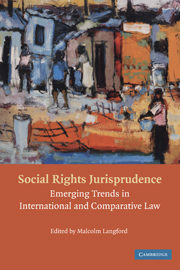Book contents
- Frontmatter
- Contents
- Foreword – Philip Alston
- Preface
- PART ONE OVERVIEW
- PART TWO SELECT NATIONAL JURISDICTIONS
- PART THREE REGIONAL PROCEDURES AND JURISPRUDENCE
- PART FOUR INTERNATIONAL HUMAN RIGHTS PROCEDURES AND JURISPRUDENCE
- PART FIVE SPECIAL TOPICS
- 28 The International Labour Organisation
- 29 Liability of Multinational Corporations
- 30 The World Bank Inspection Panel
- Notes on Contributors
- Table of Authorities
- Index
- References
30 - The World Bank Inspection Panel
An Integrated Approach to Economic and Social Rights
Published online by Cambridge University Press: 05 June 2012
- Frontmatter
- Contents
- Foreword – Philip Alston
- Preface
- PART ONE OVERVIEW
- PART TWO SELECT NATIONAL JURISDICTIONS
- PART THREE REGIONAL PROCEDURES AND JURISPRUDENCE
- PART FOUR INTERNATIONAL HUMAN RIGHTS PROCEDURES AND JURISPRUDENCE
- PART FIVE SPECIAL TOPICS
- 28 The International Labour Organisation
- 29 Liability of Multinational Corporations
- 30 The World Bank Inspection Panel
- Notes on Contributors
- Table of Authorities
- Index
- References
Summary
ORIGINS OF THE INSPECTION PANEL
In the 1980s and early 1990s, the World Bank (or the ‘Bank’) came under increasing public criticism and scrutiny for helping to catalyse projects with immense negative environmental and social impacts. In response to public and internal critiques, the World Bank adopted a series of social and environmental policies to try to minimise, mitigate and compensate for these negative impacts, thereby aiming to improve decision making, project quality and development effectiveness. These policies became known as the ‘safeguard’ policies, reflecting the assumption that they would help to prevent harm from occurring. Although many of these original policies were considered strong when they were first adopted, controversial projects were still approved and constructed despite violations of those policies.
The Sardar Sarovar dam project on the Narmada River in India is a classic example of the World Bank's involvement in, and promotion of, high-impact projects. Resistance to the project at the local level was joined by national and international civil society organisations. This coordinated pressure led to the first ever independent review of a World Bank project. The review, authorised by the World Bank, was led by Bradford Morse, and the report of the investigation became known as the Morse Commission report.
The Morse Commission documented numerous instances in which World Bank staff had knowingly violated the Bank's environmental and social policies. The report also showed that the Bank had tolerated violations of the loan covenants by the borrowing governments.
- Type
- Chapter
- Information
- Social Rights JurisprudenceEmerging Trends in International and Comparative Law, pp. 628 - 640Publisher: Cambridge University PressPrint publication year: 2009



